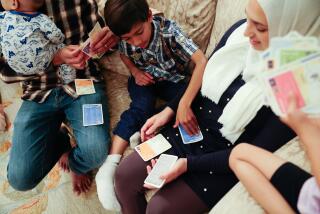Try to Keep Things Normal for Kids
- Share via
Children who are ill, or who have ill parents, require thoughtful care during the holidays.
That doesn’t mean extra gifts or over-attention.
“Our watchword for families is to try to keep life as normal as possible,” says Dr. Ernie Katz, director of the psychosocial and behavioral sciences program at Jonathan Jaques Children’s Cancer Center in Long Beach.
“It’s that kind of normal routine that children find very reassuring. When people start doing things way overboard, that can end up frightening children. They get a sense of ‘I must be really bad off if I’m getting all this.’ ”
Commonly, an ill child will get extra attention while siblings get less. That imbalance is detrimental to everyone.
“The impact on the other brothers and sisters has to be taken into account,” says Katz, who directs support services for children with cancer and their families. “It’s better to try to keep things balanced.”
The Solomon family of Cerritos has spent several Christmases dealing with 17-year-old Scott’s chronic leukemia. The illness was diagnosed in 1986, and Scott had one unsuccessful bone marrow transplant. He will undergo a second early next year.
For Jack and Darla Solomon, Scott and his brother, Bryan, 19, it is important to create quiet family time during the holidays.
“Time is one of the issues you deal with,” Darla says. “You have doctor’s visits, lab visits. How do you spread your time? And there are so many holiday activities and fun things to do. What do you say ‘no’ to and to what do you say ‘yes’ to? When Scott gets worn out, he tends to get ill.”
One way to handle this is to allow children some freedom to do as they want. But also try to plan rest time.
“You just want that quality time with the child, not running around from mall to mall to get gifts,” Darla says. “Something like quiet sitting by the fireplace and talking about fun holidays in the past is nice.”
A family should be encouraged to enjoy each day for its own merits and avoid thinking of the future. Although parents and teens may have trouble with this, “enjoying the moment” comes easily to pre-adolescent children, Katz says.
“Kids are very different facing these experiences,” he says.
“Adults are more future-oriented. There is more depression during the holidays. There is a lot of reflection. There is much greater resilience and focus on the here and now with kids.”
*
When it’s the parent who is ill, children often wonder, “Who has the energy and time to make the holidays nice?” Katz says.
These children also struggle with the desire to celebrate the holidays, and yet they feel that it’s somehow wrong to be happy when mom or dad is so sick.
However, the healthy parent, extended family, friends and neighbors should encourage children to have fun during the festivities, Katz says. “We think it’s important to tell kids, ‘It is OK to enjoy yourself,’ ” he says.
It’s also important to allow children to express their worries in their own way: Some will seem indifferent or withdraw, and some will ask a lot of questions.
Katz suggests telling children: “There will be times when you have mixed feelings. And it’s good to talk about it.”
Friends and extended family can help by inviting children along on holiday outings. They also can offer to help put up a tree or drop off fresh-baked cookies.


